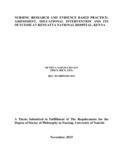| dc.description.abstract | Background: Nurses need not only to rely on their history and experience but also to critically examine what in nursing practice has beneficial outcomes for clients and which intervention works best (Roxburgh, 2006). Evidence based practice (EBP) has been shown to lead to quality, cost-effectiveness and safety in health care provision (Brown et al, 2009). The International Council of Nurses (ICN) actively supports nurses’ active participation in nursing research and the use of research to inform EBP (ICN, 2007). Despite the fact that professions and governments all over the world are adopting research based practice, this is not the case in most developing countries including Kenya where most research activities are linked to educational or academic programs (Gerrish and Lacey, 2006).
Literature shows gaps in knowledge, conduct of nursing research and use of research findings to improve patient care practices. This is despite the much reported inconsistencies in nurses’ knowledge, skills and attitudes and lack of strategies to enhance them (Hart et al, 2008). Educational efforts to assist nurses conduct research or use findings in practice have had mixed results. The status in Kenya has not been established. Studies recommend situational analysis of research activities and the influencing factors so that barriers can be effectively addressed and the concepts incorporated into practice. Helga et al (2010) argue that for research based practice to become a reality and results to be implemented and adapted in daily practice, the first necessary step is a comprehensive appraisal and assessment of the current situation. The gained information helps to identify problematic areas and to initiate necessary changes.
Objective: To assess research activities among nurses at Kenyatta National Hospital (KNH) and identify factors influencing them in order to develop, implement and examine the outcome of an
educational intervention on Nursing Research and EBP so as to promote quality of nursing services.
Methods: The study was conducted at six critical care units at KNH. These included the intensive care unit, renal unit, burns unit, cardiology unit, emergency department and operating theaters. It adopted a pre-intervention, intervention and post-intervention survey design. The pre-intervention phase (May – October, 2013) was done to survey baseline data among the nurse participants on their involvement in research activities and utilization of findings in nursing practice. During this phase, data was collected using a self-administered questionnaire from 183 nurses who were randomly sampled from the six study areas. The questionnaire had four parts with the fourth part incorporating the ‘Barriers to research utilization scale’ by Funk et al (1991). This scale was used because it has been found to have high face and content validity by various researchers.
Qualitative data was collected using a focus group discussion with 8 senior nurses comprising clinicians, administrators and educators. Also, key informant interviews were conducted with 13 nurses conveniently selected from each of the study areas. Further information was obtained from the Nursing Council of Kenya (NCK) with regard to the various syllabi for nurses’ training in Kenya. The combination of quantitative and qualitative methods yielded more useful data than either used alone. Quantitative data was analyzed using SPSS version 20.0 and qualitative data analyzed using themes. Pearson’s chi square was used to describe the associations between participants’ demographic characteristics and performance of research activities. The findings from phase one formed the basis for phase two.
The intervention phase (November 2013 – September 2014) involved development, pretesting and implementation of a training program on principles of Nursing Research and EBP as per the
needs identified in the baseline survey. The training was conducted for one month to a proportionate sample of 67 out of the initial 183 nurses and included a written pretest, lectures, discussions, formation of journal clubs, presentations and a posttest. The trained cohorts were followed up and monitored in the study areas for four months as they performed different roles of a nurse in research. The post-intervention phase (October – November 2014) involved data collection from the trained nurses. The data was analyzed and results compared to those in the first phase in order to evaluate the outcomes of the training program. Paired t-tests of mean differences between participants’ scores and performance of research activities before and after intervention were computed. Mean differences in performance of research activities between all six study areas and nursing qualifications were analyzed using one-way ANOVA.
Results: The baseline survey results showed low level of research participation and/or implementation of research findings in nursing practice. About 21% (n=38) of the nurse participants oftenly or very oftenly participated in research related to their work with the most participated activity being data collection (74.3%). The rest (79%, n=145) were rarely or not participating in research activities at all. Only 20.8% had done a research other than the one they did during nursing training for academic qualification. A minority, (11.5%, n=21) read journals/publications weekly or fortnightly.
About 71% of the respondents indicated basing their evidence for practice on knowledge gained during their nursing training. Pearson’s correlation showed significant association between post basic training or short courses, professional qualification and roles played with doing research and/or implementation of research findings in nursing practice (P < 0.05). The underpinning factors to the low level of research involvement and non-utilization of findings in practice were inadequate knowledge/skills, viewing research as difficult, lack of mentorship and support, | en_US |
| dc.description.department | a
Department of Psychiatry, University of Nairobi, ; bDepartment of Mental Health, School of Medicine,
Moi University, Eldoret, Kenya | |



